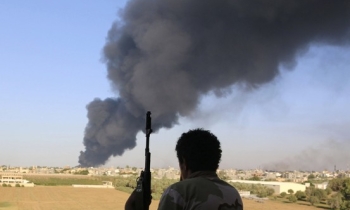Six years after Ukranian journalist Heorhiy Gongadze was murdered, his killers remain unpunished. Worse, press freedom organisations fear justice may never be done.

Gongadze disappeared on September 16, 2000. Two months later, a body with the cut-off head was found in the woodland near Kiev and identified as that of Gongadze. The death of Gongadze created a furore and speculations were rife over then President Leonid Kuchma's possible involvement in the murder. Kuchma denied the accusations.
On September 15, Ukrainian parliament Verkhovna Rada heard official testimonies pertaining to the case, 5tv reported. Prosecutor General Oleksandr Medvedko said the murder of Gongadze was organised by Oleksiy Pukach, who fled the country in 2004, and committed by Pukach's police accomplices who are still being tried.
After six years, the authenticity of recordings of Ukrainian officials plotting the murder has not yet been proven. Medvedko stated the necessity for former president Kuchma's bodyguard Mykola Melnychenko to provide his original tapes as evidence. Melnychenko still refuses to do so because he fears they will be destroyed, and has even said he is ready to serve time if charged with divulging national secrets – as long as he gets to share a prison cell with Kuchma, who he claims, is a key figure in the murder plot.
Reporters sans Frontières (RSF), in a statement, noted that the "Melnychenko tapes" uncovered by the press implicated the country's top leadership in Gongadze's kidnapping and subsequent death, but said that the investigation was now at a standstill despite new President Viktor Yushchenko's promise to solve the case.
Yushchenko himself pledged September 16 that he would do everything possible to solve the murder of Gongadze. "The president said he would do everything within his power to solve the case," the presidential press service said. Yushchenko said it was extremely important to bring to account not only the perpetrators of the murder but also the organisers and those who ordered it. "Gongadze's name became for Ukraine the symbol of political changes in the freedom of speech," Yushchenko said.

The Melnychenko tapes, some of which were transcribed and published on the Internet, have never been officially recognised as genuine in Ukraine. On the contrary, the former government of President Leonid Kuchma has made many attempts to put their authenticity in doubt and suggest that they were doctored to compromise Kuchma and other top-ranking Ukrainian officials.
Which is no surprise, says Radio Free Europe / Radio Liberty (RFE/RL) – the Melnychenko tapes suggest that Kuchma might at least have inspired former Interior Minister Yuriy Kravchenko to abduct Georgian-born Heorhiy Gongadze, founder and editor in chief of the Ukrayinska Pravda muckraking and investigative website in Ukraine, and "drive him out to Georgia" or hand him over to "the Chechens."
The Kiev central court September 14 resumed the trial of the alleged killers, two days before the sixth anniversary of Gongadze's disappearance, but neither his mother Lessia or widow Myroslava were present. Lessia's new lawyer, former justice minister Serhy Holovati, was also absent and the case was adjourned yet again.
Olena Prytula, current editor of Ukrayinska Pravda, told the court that the journalist had found he was being spied on and had told prosecutor-general Mykhailo Potebenko in an open letter, a RSF statement said. He had approached the then head of the opposition Socialist Party, Oleksander Moroz, who advised him to go into hiding.
Prytula said she recognised one of the accused, Mykola Protassov, but was not sure where she had seen him. Protassov has pleaded illness many times since the last hearing two months ago, causing two adjournments and provoking fears of a third. Myroslava Gongadze's lawyer, Valentyna Telychenko, told journalists all he could hope for with his illness was a reduced sentence.

Myroslava said in mid-August she would file a complaint against the prosecutors in charge of the case, but Telychenko said no law obliged the state to compensate victims of state officials. She will not, therefore, get any damages even if all the killers are punished.
Russia, India and Israel are said to have pledged to aid Ukraine in solving the case. According to Medvedko, it is possible that Pukach is residing in one of these countries. Medvedko said that in 2003 Pukach tried to obtain a visa to India through friends in the Ukrainian militia, aware of the fact that he would inevitably be called in to testify in the murder case. Pukach was last reported to be in Israel in late 2004, but a joint operation with Israeli law enforcement failed to capture him. According to Medvedko, officials in these three countries have said they will search for the fugitive and if successful will extradite him to Ukraine, a 5tv report said.
Last week, Ukrainian journalists began a new public awareness campaign about the murder of their colleague and recent threats to freedom of speech. As part of their campaign titled 'Hands off our freedom', the Independent Media Union plans to begin rating who they deem are 'Enemies of the Press'.
Attacks on journalists have, meanwhile, continued. In August, a number of journalists were kidnapped, beaten and denied access to press conferences. The International Federation of Journalists (IFJ) says that on August 9, in an act uncannily reminiscent of Gongadze's abduction and murder, correspondents of Nashe Radio Station were kidnapped in broad daylight in the centre of Kiev and taken to the forests where they were assaulted. The next day Fiodor Saliy, director of the Crimean Broadcasting Company of Foros, was also assaulted.
"IFJ is appalled that six years later the people who ordered Gongadze's assassination remain free," said Oliver Money-Kyrle, IFJ programmes director. "The recent rise in attacks against journalists is a result of that failure and will only serve to encourage further acts of intimidation, assault and murder."
Gongadze timeline by Radio Free Europe / Radio Liberty (RFE/RL):
- June 2000: Gongadze complains of harassment by the secret police.
- September 2000: Gongadze disappears on September 16. Kuchma orders an inquiry on September 21. The Ukrainian parliament sets up a special commission.
- November 2000: Gongadze's headless body is found on November 2 on the side of a forest road some 70 km from Kiev. The prosecutor suggests the body may not be Gongadze's. It is eventually officially identified in March 2003. On November 28, the Socialist Party leader Oleksandr Moroz publicizes tapes secretly recorded by a former presidential bodyguard (later identified as Major Mykola Melnychenko) that capture Kuchma saying: "Drive him [Gongadze] out! Throw him out! Give him to the Chechens!" Kuchma threatens legal charges. He later admits the voice is his, but says the tapes have been doctored. The tape excerpts relating to Gongadze are later authenticated by a US expert.
- December 2000 – February 2001: Demonstrations in Kiev attract crowds of up to 100,000 people. Despite the cold, some sleep in tents. In February, Kuchma sacks the head of the secret services and the head of his team of bodyguards. Police eventually break up the demonstrations.
- April 2001: Government led by Viktor Yushchenko falls after losing a vote of confidence.
- May 2001: Interior Minister Yuri Smirnov says Gongadze was killed by two "hooligans" with gangster links. Both are already dead. The prosecutor-general refutes Smirnov's claims.
- September 2002: Police break up street protests to mark the anniversary of Gongadze's death.
- May 2003: Local prosecutor convicted of abuse of office and falsification of evidence in the Gongadze case. Senior Interior Ministry official arrested, but released two weeks later.
- August 2003: A prime suspect, Ihor Honcharov, dies in police custody. His body is cremated before the cause of death is announced.
- June 2004: Government says a gangster identified only as "K" had confessed to killing Gongadze.
- March 2005: President Yushchenko announces on March 1 that the suspected killers are in custody. Prosecutor-General Svyatoslav Piskun says two Interior Ministry policemen strangled Gongadze. A key witness in the Gongadze case, former Interior Minister Kravchenko, is found dead on March 4. Authorities say he committed suicide. He had two gunshot wounds, to the chin and temple. A suicide note blames Kuchma for Gongadze's death.
- October 2005: The Parliamentary Assembly of the Council of Europe raises reservations about the handling of the case. Yuschenko fires Piskun.
- November 2005: The European Court of Human Rights awards Gongadze's wife 100,000 euros in damages, ruling that the Ukrainian authorities had done too little to protect Gongadze, or to investigate his death.
- January 2006: Trial of three former policemen charged with killing Gongadze begins.









